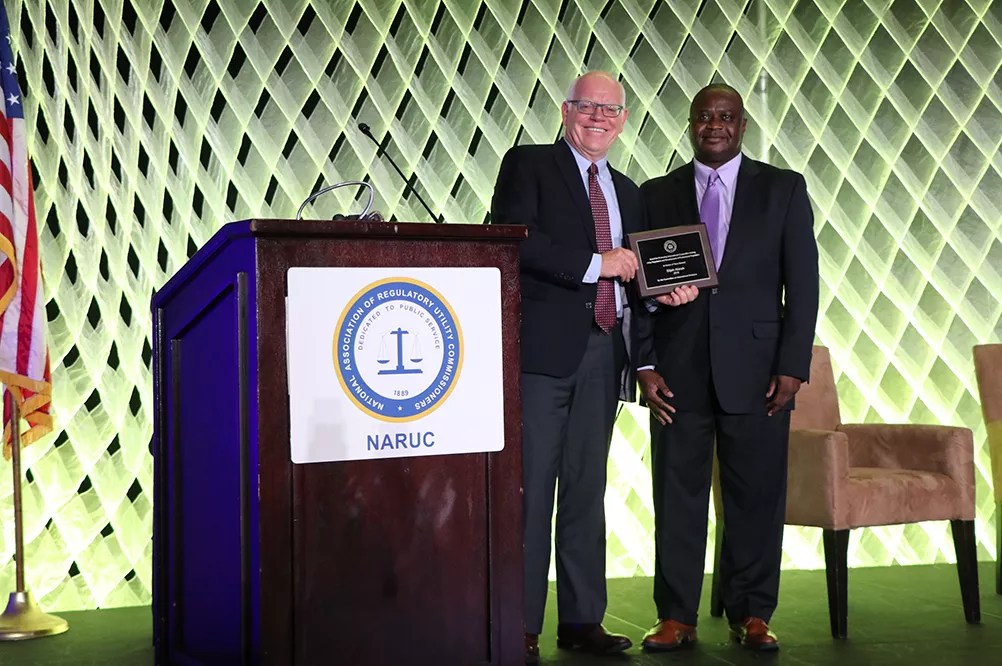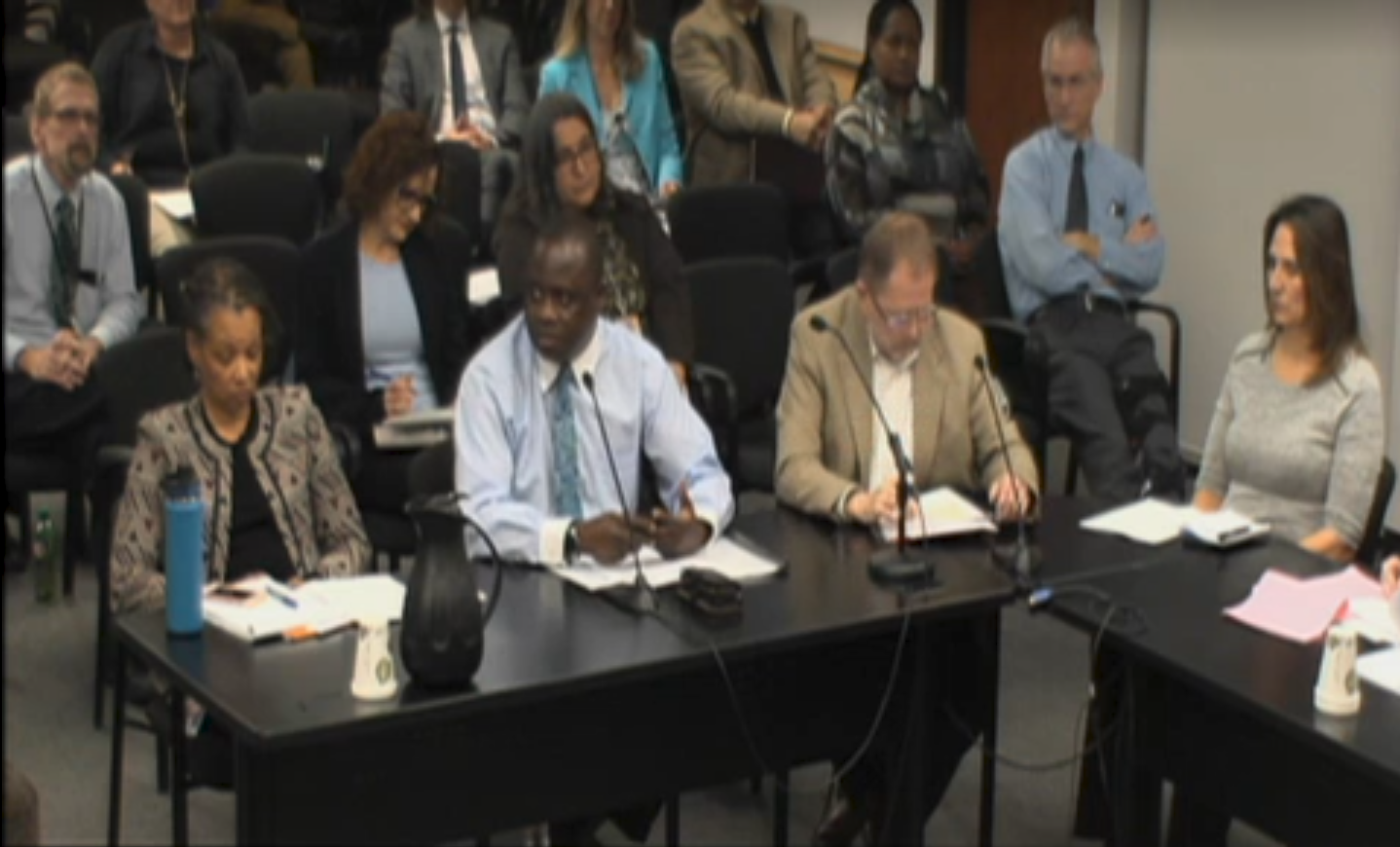

Audio By Carbonatix
As director of utilities at the Arizona Corporation Commission, Elijah Abinah has traveled the country and the world.
In 2017 and 2018, he visited six states and Washington, D.C., and took five trips to four different countries, dispensing advice to regulatory commissions there under programs backed by the U.S government. On one trip to Nigeria, he was tasked with staving off a protest planned over rate increases and blackouts.
Abinah spent at least six weeks, including some weekend days, abroad over the course of 2017 and 2018. Abinah’s travels were on Arizona Corporation Commission time, according to Commission spokesperson Holly Ward.
Taxpayers footed the bill for three of the domestic trips and fronted the money for four others, according to calendars, travel records, and receipts that Phoenix New Times obtained through a public records request. New Times’ emailed questions and request to speak with Abinah were met with emailed responses from Ward and an offer shortly before publication for him to answer questions via email.
Three of those domestic trips were to policy meetings, conferences, and forums hosted by the National Association of Water Companies, which also bankrolled those travels.
The other nine were for the National Association of Regulatory Commissioners, a membership organization for state utility regulators. Abinah attended its annual meetings in the U.S., but he also went abroad for its international work, including implementing the federal government’s Power Africa initiative.
That program is run by the U.S. Agency for International Development, which promotes U.S. foreign policy interests through soft power and development aid. It was launched in 2013 with the aim of doubling Africa’s electricity production. A year later, an investigation by Reuters found that the project was measuring its progress not in megawatts delivered but promises of power through deals it fostered.
Meanwhile, some of the projects allegedly facilitated by Power Africa were actually begun years before by others, Reuters found. It noted, too, that rights groups viewed the project as a way to subsidize U.S. companies, including one consulting group that landed a $64 million contract.
Project Africa’s annual report for 2018, based on deals closed, showed that the plurality of energy came from natural gas – about 4,000 megawatts. About 2,300 megawatts came from wind, and 1,500 from solar.
NARUC International describes its mission as supporting “effective energy sectors that enable economic and societal growth.”

Elijah Abinah at an Arizona Corporation Commission meeting.
Arizona Corporation Commission
According to Ward, Abinah, who is originally from Nigeria, was chosen by NARUC through a “competitive selection process” to work on the project and does not receive a salary from the organization for his work.
The Corporation Commission says that Abinah’s domestic and international travels benefit Arizona taxpayers.
“This exchange provides useful tools that enable the continuous improvement of regulatory practices on behalf of Arizona ratepayers,” Ward said.
NARUC funded Abinah’s international trips. In 2017 and 2018, Abinah went to Uganda (one week), Nigeria (two weeks), Rwanda (the amount of time is unclear from his schedule), India (two weeks), and Rwanda again (one week) for the group.
Last November, he took a five-night trip to Orlando for a four-day conference and to accept an award from the association for that international work. The association covered much of the cost of that travel, too, although taxpayers picked up at least $472.50 of the tab.
The Arizona Corporation Commission is charged with regulating the utilities in the state, including water companies. An assistant director since 2003, Abinah was appointed acting director of the utilities division on January 6, 2017, and eventually was promoted to director. He is directly involved with determining how much companies can charge for electricity, gas, and water, as he oversees staff who review rate cases and make recommendations to commissioners.
The precise amount of taxpayer dollars that went to Abinah’s travels over the past two years isn’t clear from the records, which included receipts and reimbursement forms. In cases where hotels and flights were prepaid with the utilities division credit card, amounts were not provided, despite New Times’ request for all records showing the costs of travel and who paid.
In February 2018, for instance, Abinah traveled to Washington, D.C., for the winter policy summit of the National Association of Regulatory Commissioners. Ground transport and meals alone cost $416.74. How much the state paid for airfare is not clear, but six nights at the Renaissance Hotel, where today the least expensive room starts at $322 per night, went on the utilities division credit card.
The Corporation Commission lauds Abinah’s globetrotting, describing it as “selfless,” even though it is done on Arizona Corporation Commission time.
“The value of Mr. Abinah’s work transcends the boundary of statewide utility regulation as he has selflessly given his time and shared his expertise across international borders,” Corporation Commission Chairman Tom Forese said in a press release last November announcing that Abinah had won NARUC’s award.
During one trip, the release said, Abinah traveled to Nigeria “to mediate between Electric Distribution Companies, Labor Union, [sic] and other stakeholders to avert a planned major protest in Nigeria due to a proposed rate increase and constant blackouts.”
“The fact that this is my native country, it’s very exciting to go there,” Abinah said last year in an episode of the Arizona Corporation Commission podcast, which you can find on SoundCloud.
“The goal is to go there to assist, to educate, and help them with the regulatory system and hopefully infrastructure development,” he told interviewer Angie Holdsworth, then a spokesperson for the Corporation Commission, when she asked what Arizonans gained from his trips abroad. “We learn from them, they learn from us.”
Abinah’s other domestic travels have been to gatherings hosted by the National Association of Water Companies, a lobbying group for the private water industry. The group reimbursed the Corporation Commission for the cost of those three trips: New Orleans in January 2017, Seattle in October 2017, and Charleston in January 2018.
Both regulators and the representatives from the companies they are tasked with regulating gather at these conferences. The National Association of Water Companies describes its annual staff water policy forum, for instance, as a place for the industry to advocate for policies that benefit it. Its goal is to get states to adopt these practices.
“Mr. Abinah is open to meeting with everyone who participates in any given case,” Ward said in response to a question Abinah’s attendance at those meetings. “Commission staff’s role is to balance the interest of all parties to a case, whether they are a company, ratepayer, and/or stakeholder.”